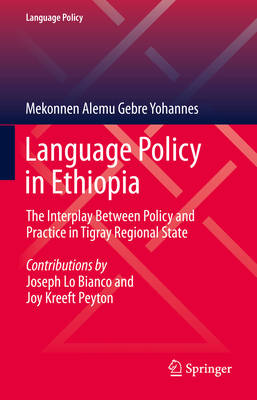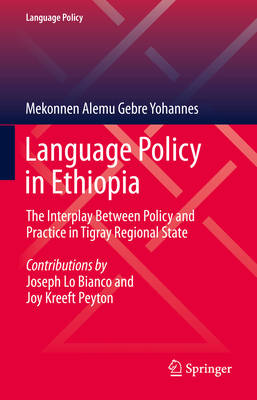
- Afhalen na 1 uur in een winkel met voorraad
- Gratis thuislevering in België vanaf € 30
- Ruim aanbod met 7 miljoen producten
- Afhalen na 1 uur in een winkel met voorraad
- Gratis thuislevering in België vanaf € 30
- Ruim aanbod met 7 miljoen producten
Zoeken
Language Policy in Ethiopia
The Interplay Between Policy and Practice in Tigray Regional State
Mekonnen Alemu Gebre Yohannes
€ 244,45
+ 488 punten
Uitvoering
Omschrijving
This book examines the interplay and tensions between hegemonic and counter-hegemonic language policy and processes in Tigray, a regional state of Ethiopia, in the period of pre- and post-1991. Viewing language use and language policy as dynamic social and ideological processes, the book presents Ethiopia as an example of language policy creation and implementation over time, in a highly volatile political context. The case of Ethiopia is unique in that different language policies and practices were put in place as the country's leaders changed through political takeovers. Declared language policies were not always implemented, and those implemented were often protested. The book starts with an overview and review of language policy and planning, followed by a chapter on the history of such planning in Ethiopia. It then presents the methodology used for the study, and examines the appropriation of hegemonic LPP, patterns of resistance, schools and public sites as centers of resistance, and the emergence and development of specific patterns of language use in different regions of the country. The book ends with recommendations for future research, and draws the overall conclusion that since LPP is a dynamic and multilayered contextual process, official or de facto language policy is often undermined by overt or covert unofficial language policies, ideologies, mechanisms, and agents that result in different patterns of language use.
Specificaties
Betrokkenen
- Auteur(s):
- Uitgeverij:
Inhoud
- Aantal bladzijden:
- 171
- Taal:
- Engels
- Reeks:
- Reeksnummer:
- nr. 24
Eigenschappen
- Productcode (EAN):
- 9783030639037
- Verschijningsdatum:
- 19/02/2021
- Uitvoering:
- Hardcover
- Formaat:
- Genaaid
- Afmetingen:
- 196 mm x 239 mm
- Gewicht:
- 453 g

Alleen bij Standaard Boekhandel
+ 488 punten op je klantenkaart van Standaard Boekhandel
Beoordelingen
We publiceren alleen reviews die voldoen aan de voorwaarden voor reviews. Bekijk onze voorwaarden voor reviews.











